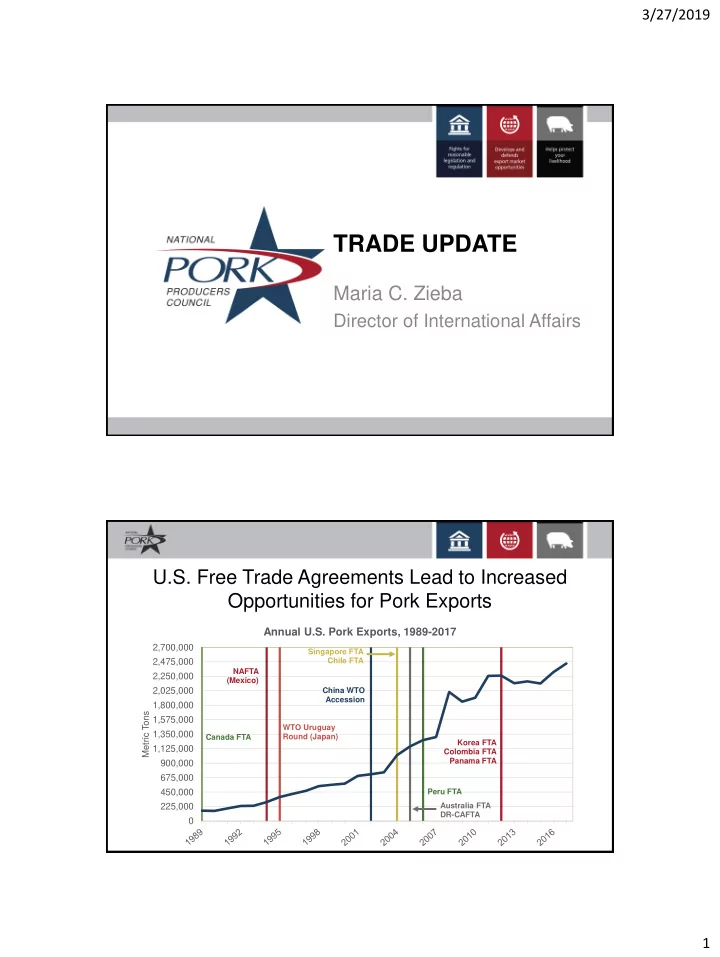

3/27/2019 TRADE UPDATE Maria C. Zieba Director of International Affairs U.S. Free Trade Agreements Lead to Increased Opportunities for Pork Exports Annual U.S. Pork Exports, 1989-2017 2,700,000 Singapore FTA 2,475,000 Chile FTA NAFTA 2,250,000 (Mexico) 2,025,000 China WTO Accession 1,800,000 Metric Tons 1,575,000 WTO Uruguay 1,350,000 Canada FTA Round (Japan) Korea FTA 1,125,000 Colombia FTA Panama FTA 900,000 675,000 450,000 Peru FTA 225,000 Australia FTA DR-CAFTA 0 Data Source: USDA FAS 1
3/27/2019 Trade Agreements Create Opportunities for U.S. Agriculture Korea, Colombia, Panama Trade Agreements Billion U.S. $150 CAFTA-DR $135 billion Trade Promotion Authority Doha Development Round China in WTO $120 Fast Track $115 billion Uruguay Round of GATT $90 Trade Act of 1988 NAFTA Tokyo Round of GATT Japan: Beef and Citrus $60 Trade Act of 1974 Kennedy Round Of GATT General Agreement on Tariffs and Trade (GATT) $30 U.S. Agricultural Exports U.S. Agricultural Imports $0 1946 1950 1954 1958 1962 1966 1970 1974 1978 1982 1986 1990 1994 1998 2002 2006 2010 2014 Data Source: USDA-FAS Global Agricultural Trade System (GATS) CY Basis NAFTA Partners Remain Critical to U.S. Pork Exports U.S. Pork Exports by Destination, 2018 South Korea 10% Japan 16% Mexico 32% NAFTA 41% China/Hong Kong 14% Canada 9% ROW 19% 2
3/27/2019 TRADE WORKS ▪ Promotes rural prosperity ▪ Exports added over $51 to price of each hog marketed ▪ 110,000+ U.S. jobs are dependent on pork exports 2018 Trade Actions ▪ Many trade investigations initiated: – Section 201: Washers, Solar Panels – Section 232: Steel, Aluminum, Cars, Trucks, Auto Parts, Titanium Sponges – Section 301: China ▪ Retaliation began in 2018, continues and could worsen this year: – China (pork already on two retaliation lists) – Mexico (pork already on retaliation list) – Other countries? 3
3/27/2019 Export Value to Mexico Feeling Impact of Retaliatory Tariffs U.S. Export Value to Key Markets YTD, 2014-2018 $1,800 *Percentages indicate change from previous year 3% $1,600 $1,400 4% 1% -19% 31% -1% 15% $1,200 Million USD -11% 4% -19% $1,000 52% 0% $800 7% -19% 2% -14% -1% -15% $600 -4% -10% 44% $400 11% 31% 64% -26% $200 $0 South Korea Canada China/HK Mexico Japan 2014 2015 2016 2017 2018 Data Source: USDA FAS USMCA ▪ Mexico and Canada are vital markets – Mexico #2 export market - $1.3B in 2018 – Canada #4 export market - $764M in 2018 – Over 19,000 U.S. jobs (combined) Withdrawing from NAFTA without a replacement would cost the industry $1.5 billion or $12 per animal 4
3/27/2019 Japan Deal Needed ASAP ▪ Bilateral Negotiations – #1 Export Market • $1.6 billion pork exports – Additional competition from EU and CPTPP Must Have Access to New Markets ▪ Bilateral Negotiations Need to Begin: – South East Asia – UK: FULL market access – EU: Ag MUST be included. FULL market access 5
3/27/2019 Working on New Markets… ▪ Bilateral pork trade issues examples: – Australia – Brazil – India – Indonesia – Nigeria – Singapore – South Africa – Taiwan – Thailand – Vietnam African Swine Fever ▪ Disease only affects pigs; not a health risk for people or a food safety risk ▪ Spreading throughout Asia and Northern Europe ▪ Imports/Exports ▪ What are we doing to reduce the risk? – Working with producers – Working with the USDA on safeguards against contaminated ag imports – Response planning – Research on feed testing – More beagles – U.S. customs on border biosecurity coordination – Development of global network of swine vets, producers, government officials to monitor globally, share best practices, etc. (along with NPB, AASV, SHIC) ▪ Best defense is prevention 6
3/27/2019 Other NPPC Priorities: Gene Editing ▪ Accelerates genetic improvements ▪ Allows for simple changes in a pig’s native genetic structure without introducing genes from another species ▪ Move regulatory oversight of gene editing in animals from the FDA to the USDA’s Animal and Plant Health Inspection Service (APHIS) ▪ Regulation of gene editing in animals by the FDA as an “animal drug” is not appropriate or practicable – Oversight at FDA will cede this critical technology to competing nations ▪ Innovation is key to success of industry 7
3/27/2019 California Proposition 12 ▪ A ballot initiative banning the sale of pork from hogs born to sows raised – anywhere in the U.S. - in gestation stalls – Defined as less than 24 sq. ft. ▪ Approved by California voters in November 2018 ▪ Effective Jan. 1, 2022 ▪ Next step: CA rule-making process ▪ Massachusetts passed a similar initiative in 2016 Farm Bill Implementation ▪ Vaccines exist today to help mitigate damage ▪ Farm Bill provided mandatory funding – $120 million over first 4 years, $30 million in 5 th year – State block grants, NAHLN, vaccine bank ▪ USDA must work to quickly secure FMD vaccine to safeguard rural economies 8
3/27/2019 Thank You! Maria C. Zieba ziebam@nppc.org 9
Recommend
More recommend